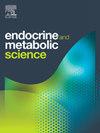COVID-19严重程度与血糖升高的相关性
Q3 Medicine
引用次数: 0
摘要
COVID-19和2型糖尿病(T2D)的冲突表明,T2D是COVID-19中第二大常见合并症。这种感染加剧了糖尿病患者的并发症。它通过释放过量的糖皮质激素和儿茶酚胺来升高血糖。这种高血糖会触发促炎单核细胞,提高血小板反应性,并增加糖尿病患者的心血管死亡。这项横断面研究是在巴格达私立养老院医院进行的,重点研究了2021年5月至8月期间通过PCR在鼻咽分泌物中检测RNA诊断的143名COVID-19患者。患者年龄18至76岁,入院时无糖尿病病史。对照组86人,无新冠肺炎和糖尿病病史,年龄在20至73岁之间。测定BMI、血小板计数、WBC、ESR、RBG、血清丙氨酸转氨酶(ALT)、天冬氨酸转氨酶(AST)、碱性磷酸酶(ALP)水平。结果显示,两组患者的RBG差异具有统计学意义(p值= 0.001),ALT和AST酶水平的Mean±SD值以及WBC和ESR的差异具有统计学意义,与未患COVID的患者相比。综上所述,我们的研究结果表明入院时高血糖与重症COVID-19的风险呈正相关,强调了监测和管理血糖水平的重要性。有效的血糖控制有助于缓解COVID-19的进展,是综合治疗的组成部分。这些血糖相关的变化和COVID-19对胰腺的影响可能导致T2D的发展。本文章由计算机程序翻译,如有差异,请以英文原文为准。
The correlation between COVID-19 severity and elevated level of serum glucose
The collision of COVID-19 and type 2 diabetes (T2D) highlights T2D as the second most prevalent comorbidity in COVID-19. This infection exacerbates complications in diabetics. It elevates blood glucose through excessive glucocorticoid and catecholamine release. This hyperglycemia triggers pro-inflammatory monocytes, heightens platelet reactivity, and amplifies cardiovascular deaths in diabetics. This cross-sectional study, conducted at Private Nursing Home Hospital in Baghdad, focused on 143 COVID-19 patients diagnosed via RNA detection in nasopharyngeal secretions using PCR from May to August 2021. The patients, aged 18 to 76, had no prior history of diabetes upon admission. An 86-member control group, free from COVID-19 and diabetes history, aged 20 to 73, was also included. BMI, platelet count, WBC, ESR, RBG, and serum levels of the alanine aminotransferase (ALT), aspartate aminotransferase (AST), and alkaline phosphatase (ALP) levels were measured. The results revealed statistically highly differences in RBG between the two groups (p-value = 0.001), and significant variations in the Mean ± SD values of ALT and AST enzyme levels, as well as in WBC and ESR, when comparing COVID patients to non-COVID patients. In summary, our findings show a positive correlation between admission hyperglycemia and the risk of severe COVID-19, emphasizing the significance of monitoring and managing blood glucose levels. Effective glycemic control could aid in mitigating COVID-19 progression and is integral to comprehensive treatment. These glucose-related changes and COVID-19 impact on the pancreas may contribute to the development of T2D.
求助全文
通过发布文献求助,成功后即可免费获取论文全文。
去求助
来源期刊

Endocrine and Metabolic Science
Medicine-Endocrinology, Diabetes and Metabolism
CiteScore
2.80
自引率
0.00%
发文量
4
审稿时长
84 days
 求助内容:
求助内容: 应助结果提醒方式:
应助结果提醒方式:


